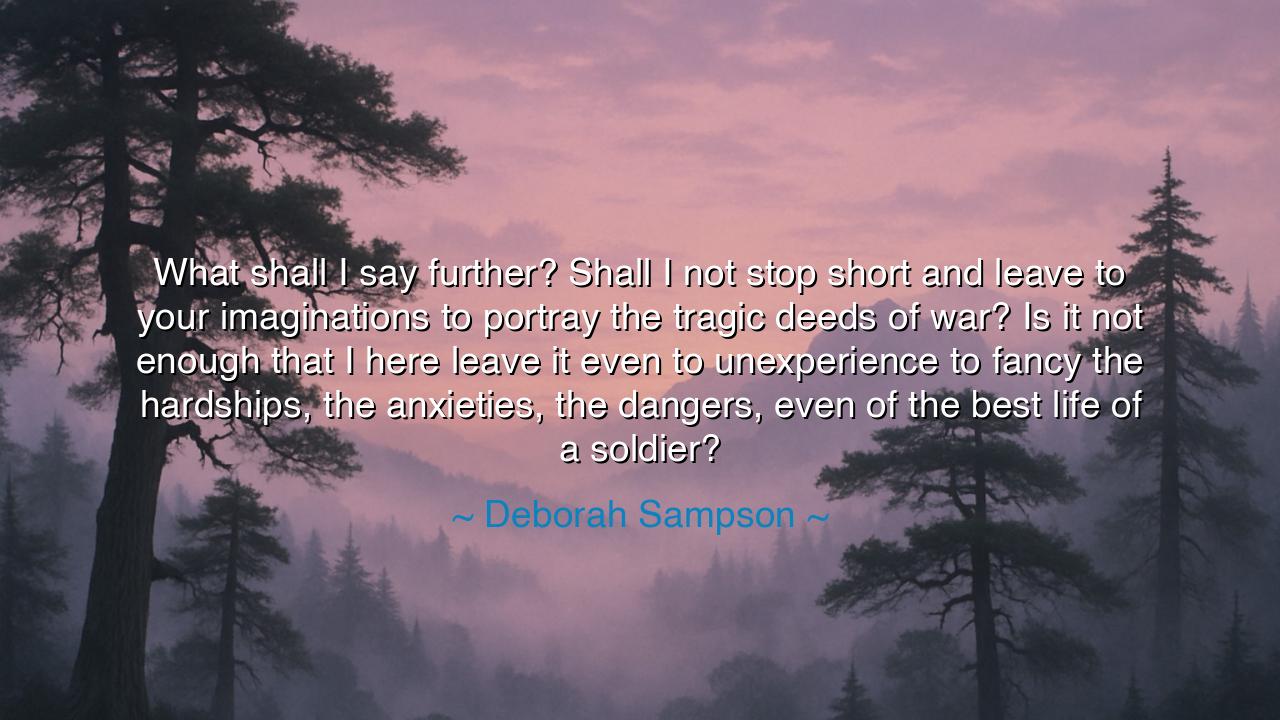
What shall I say further? Shall I not stop short and leave to
What shall I say further? Shall I not stop short and leave to your imaginations to portray the tragic deeds of war? Is it not enough that I here leave it even to unexperience to fancy the hardships, the anxieties, the dangers, even of the best life of a soldier?






Opening Scene
The quiet murmur of the evening is broken only by the soft rustling of paper, the steady rhythm of Jack’s pen scratching across his notebook. The room is dimly lit, the only light coming from the soft glow of a desk lamp. Outside, the world is still, the city’s distant hum a reminder of life moving on. Inside, there’s a heaviness in the air, a quiet weight of history and reflection that hangs between Jack and Jeeny. They sit at opposite ends of the room, both focused on their thoughts, yet clearly connected by the conversation unfolding.
Host: The soft flicker of the lamp casts long shadows on the walls, and the air feels thick with anticipation. Jack looks up, his brow furrowed in thought, while Jeeny leans back in her chair, her arms crossed, as if considering something deeply. The room seems to breathe with them, each moment stretching into the next.
Jeeny: (her voice quiet, but serious) “I was thinking about something Deborah Sampson said, the way she described her experience in war. She said, ‘What shall I say further? Shall I not stop short and leave to your imaginations to portray the tragic deeds of war? Is it not enough that I here leave it even to unexperience to fancy the hardships, the anxieties, the dangers, even of the best life of a soldier?’”
Jack: (looking up, his expression thoughtful) “That’s a powerful way of putting it. She’s asking us to imagine the realities of war, not just hear about them. But I think that’s something that’s hard to grasp unless you’ve experienced it yourself.”
Jeeny: (nodding slowly, her tone reflective) “Exactly. She’s reminding us that some experiences are so traumatic, so difficult, that words can barely capture them. Even the best life of a soldier is filled with suffering, uncertainty, and fear. It’s not just about the battles, but the daily weight of what they carry.”
Host: The quiet stillness in the room grows, and for a moment, the world outside feels distant. Jack and Jeeny sit in the weight of what she’s said, the gravity of Sampson’s words pulling them into deeper reflection. The lamp flickers for a second, casting shifting shadows across the walls, and for a moment, the room feels full of unseen forces — of things that can’t easily be named.
Jack: (his voice softer now, almost unsettled) “We read about war, we watch it on the news, but we don’t truly understand it, do we? We can imagine the physical dangers, but what about the mental toll? The anxieties, the fear that doesn’t leave once the battle is over?”
Jeeny: (gently, her voice carrying a quiet empathy) “No, we don’t understand it fully. There’s so much that words can’t capture. The emotional and psychological burdens that come with war are invisible, and often, even those who have experienced it themselves can’t fully express it. But Deborah Sampson’s words ask us to consider what we don’t see, what we can’t imagine.”
Host: The room feels heavier now, the silence between them filled with a quiet respect for the experiences of those who have lived through unimaginable hardships. The outside world, once so full of distractions, seems to fade as Jack and Jeeny reflect on the true weight of Sampson’s statement.
Jack: (finally breaking the silence, his voice thoughtful) “I guess the real question is, how do we even begin to honor those experiences if we can’t fully understand them? How do we show respect for something so beyond our comprehension?”
Jeeny: (smiling softly, her voice steady) “By acknowledging that we don’t know, by recognizing the invisible struggles that go beyond what we see. By listening, by allowing the space for stories to be shared without judgment, without trying to reduce the pain to something we can understand easily. And by supporting those who’ve lived through it.”
Host: The room has grown quiet, filled with a deeper understanding, a shared awareness of the gap between experience and imagination. Jack takes a slow breath, the realization settling in. The world outside continues its rhythm, but here, in this moment, time feels slow and purposeful.
Jack: (softly, his voice grateful) “I never thought of it that way. We tend to think that if we can’t fully understand something, it doesn’t affect us — but the truth is, it does. And the real challenge is acknowledging the depth of those experiences, even when we can’t fully grasp them.”
Jeeny: (smiling warmly, her voice full of understanding) “Exactly. Some experiences, like war, are beyond what we can put into words, but that doesn’t mean they’re any less real. It’s up to us to recognize the weight, to acknowledge the sacrifice without needing to fully comprehend it. Just by being present, by listening, we show that we honor it.”
Host: The light from the window has grown dimmer now, and the city outside continues in its familiar dance. Inside, Jack and Jeeny sit together in a quiet reflection, the weight of their conversation shifting the atmosphere in the room. There is no resolution, no simple answer, but there is understanding. And sometimes, that’s all that’s needed — to sit in the unspoken, to honor the experiences we cannot fully grasp, and to share in the respect for those who live through the unthinkable.






AAdministratorAdministrator
Welcome, honored guests. Please leave a comment, we will respond soon